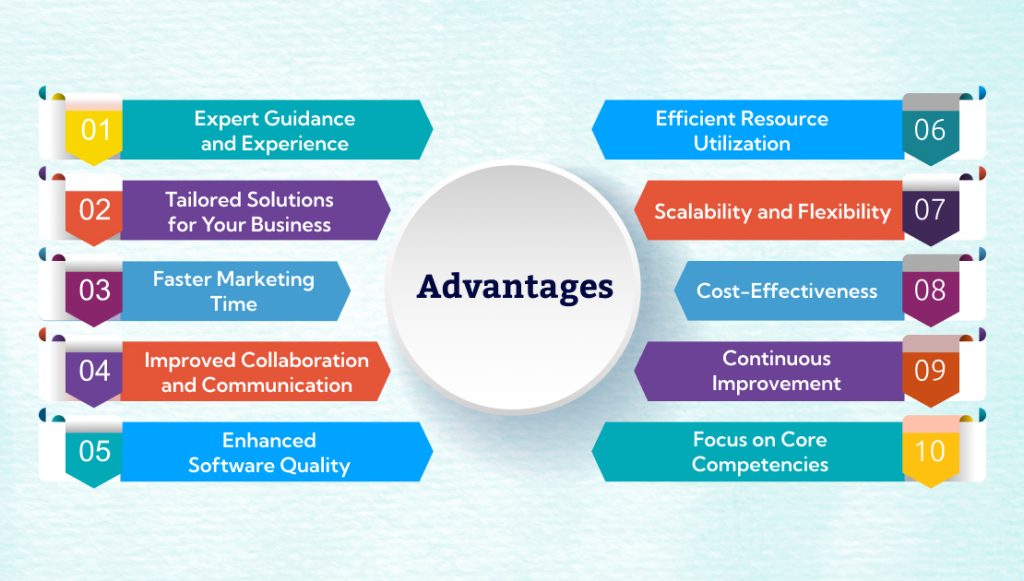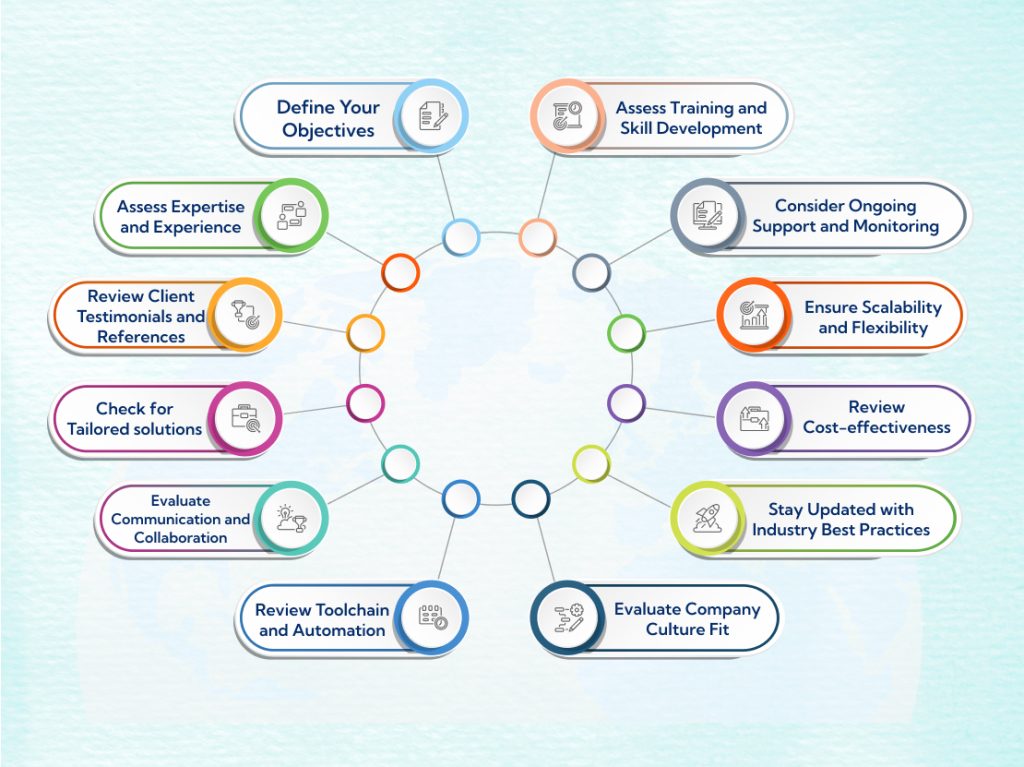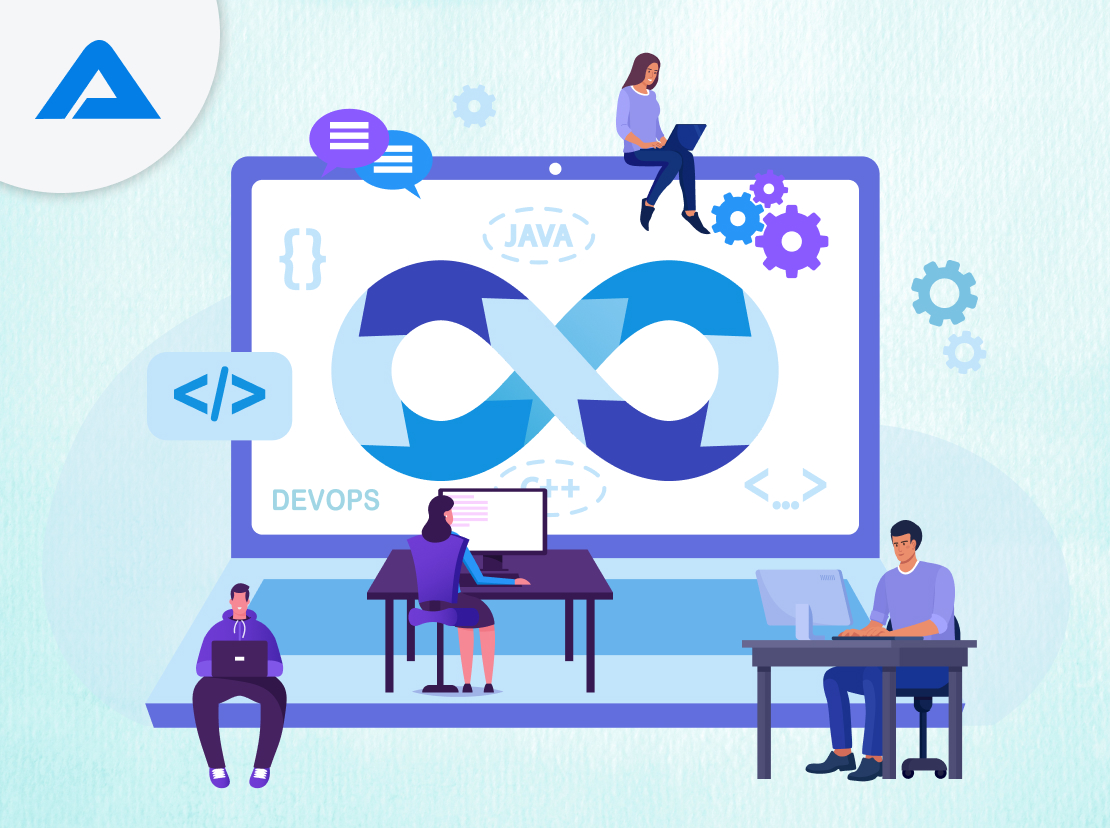In today’s rapidly evolving technological landscape, businesses increasingly embrace DevOps practices to optimize their software development and deployment processes. However, successful strategies require expertise, experience, and a comprehensive understanding of the latest tools and methodologies. This is the context in which DevOps consulting services demonstrate their significance.
DevOps has become a preferred choice for startups, empowering internal teams with coordination and strength. It ensures seamless cooperation between development and operational teams when delivering services. Opt for a DevOps consultant that aligns with your enterprise’s specific demands and requirements. Small businesses and groups, often constrained by budgets, can significantly benefit from this technology.
Consulting services play a vital role in achieving common objectives among teams. The DevOps culture addresses conflicting priorities by utilizing collective effort and gathering input from all stakeholders, resulting in faster product delivery. Selecting the right DevOps consultant is essential for successful implementation in small businesses. This article provides insights into critical considerations when choosing such consultants.
What is the role and responsibility of a DevOps consultant?
A DevOps consultant fulfils a crucial role in modern software development, where collaboration, automation, and efficiency are paramount. Their primary objective is to guide organizations in adopting and optimizing DevOps methodologies to achieve seamless and agile software delivery.
The consultants thoroughly assess the organization’s existing workflows and processes, identifying improvement areas and bottlenecks hindering productivity. They then work closely with teams to design and implement streamlined CI/CD pipelines, automation frameworks, and cloud-based solutions, ensuring smooth integration between development and operations.
In addition to technological expertise, consultants also focus on fostering a collaborative culture within the organization. They facilitate effective communication and teamwork between different teams, breaking down traditional silos and promoting shared responsibilities.
Moreover, the consultants provide valuable guidance on selecting the right tools and technologies that align with the organization’s specific needs and goals. They play a vital role in upskilling team members through training and workshops, empowering them to embrace DevOps principles confidently and practices, therefore hiring a DevOps engineer is a strategic move to foster a culture of innovation and efficiency within your organization.
What are the Advantages of Depending on DevOps Consulting Services

Depending on DevOps consulting services offer numerous benefits that can positively impact an organization’s software development and operational efficiency. Below are some of the main benefits:
1. Expert Guidance and Experience:
The consultants bring in-depth knowledge and hands-on experience implementing DevOps practices. They offer valuable insights to streamline software development, automate workflows, and foster collaboration. By leveraging their expertise, businesses can accelerate their DevOps adoption, identify and resolve bottlenecks, and ensure the seamless integration of tools and technologies. This results in faster, more reliable software releases and a competitive edge in the market, enabling organizations to adapt to change efficiently and deliver value to customers consistently.
2. Tailored Solutions for Your Business:
Consultants understand that each business is unique, and they can provide customized solutions to fit specific needs and challenges. Conducting thorough assessments and analysis, they identify areas that require improvement and design strategies tailored to the organization’s goals and existing infrastructure. This personalized approach ensures that the implementation aligns seamlessly with the business’s workflows, culture, and objectives. This leads to optimized efficiency, reduced costs, and enhanced collaboration between development and operations teams. Ultimately, this tailored approach empowers businesses to achieve their DevOps objectives more effectively and achieve sustainable success.
3. Faster Marketing Time:
The experts help businesses streamline their software development processes, reducing the time it takes to deliver products and features to the market. They enable swift and reliable software releases by implementing automation and continuous integration/continuous deployment (CI/CD) pipelines. This accelerated pace allows companies to respond promptly to market demands, gain a competitive edge, and seize opportunities more effectively. With DevOps consultants’ guidance, organizations can optimize their development workflows, ensuring a faster, more efficient path from conceptualization to product launch, ultimately maximizing their potential for success in the market.
4. Improved Collaboration and Communication:
The consultants facilitate better synergy between development and operations teams, breaking down silos that often hinder productivity. They enhance communication and understanding between these traditionally separate departments by implementing collaborative tools and shared workflows and fostering a culture of cooperation. This leads to faster issue resolution, reduced errors, and more efficient software development. Improved collaboration promotes a cohesive work environment where team members can share ideas and feedback seamlessly, resulting in higher-quality deliverables. Ultimately, this strengthened collaboration empowers businesses to achieve their goals with greater efficiency and effectiveness.
5. Enhanced Software Quality:
Consultants implement rigorous testing, automated quality assurance processes, and continuous monitoring throughout the software development life cycle. By integrating testing early and frequently, they identify and address issues promptly, leading to higher software reliability and fewer defects. They also promote a culture of accountability and ownership, encouraging developers and operations teams to work collaboratively to maintain code integrity and system stability. This emphasis on quality assurance and best practices ultimately delivers more robust, secure, and high-performing software products to customers, increasing customer satisfaction and loyalty.
6. Efficient Resource Utilization:
DevOps consultants optimize the allocation and utilization of resources, including hardware, software, and human capital, to maximize productivity and cost-effectiveness. By implementing automation and streamlined processes, they reduce manual tasks and minimize wastage of resources. DevOps consultants also identify opportunities to scale resources dynamically, ensuring businesses can efficiently handle varying workloads. This efficient resource management reduces operational expenses and improves Return on Investment (ROI). By leveraging this services, organizations can achieve better resource allocation, increased efficiency, and a competitive advantage in the market.
7. Scalability and Flexibility:
This is a significant advantage of depending on DevOps consulting services. The consultants design and implement solutions that enable businesses to scale their infrastructure and applications seamlessly to accommodate changing demands. By leveraging cloud-based technologies and automation, they ensure the flexibility to adapt swiftly to evolving market needs. They promote containerization and microservices architecture, allowing modular and easily expandable systems. This scalability and flexibility empower organizations to respond promptly to growth opportunities, handle spikes in user traffic, and optimize resource usage efficiently. With this services, businesses can stay agile and resilient in a fast-paced and dynamic business environment.
8. Cost-Effectiveness:
Consultants help businesses optimize their software development and deployment processes, leading to reduced operational costs. It minimize manual intervention and associated labour expenses by automating repetitive tasks and implementing efficient workflows. Moreover, streamlined processes and continuous monitoring prevent costly downtime and errors. Additionally, the scalability and flexibility offered by DevOps practices enable organizations to adapt their resources as needed, avoiding unnecessary infrastructure investments. Overall, by maximizing efficiency and minimizing waste, this services allow businesses to achieve cost savings while delivering high-quality products and services to customers.
9. Continuous Improvement:
DevOps consultants instil a culture of continuous learning and enhancement within organizations. By promoting iterative feedback loops and continuous integration, they encourage teams to seek opportunities for improvement consistently. DevOps consultants facilitate the adoption of monitoring and analytics tools to measure performance and identify bottlenecks, enabling proactive adjustments to optimize processes. This dedication to continuous improvement leads to increased efficiency, enhanced collaboration, and faster feedback cycles. By continuously refining development, testing, and deployment practices, businesses can stay ahead in a competitive market, deliver higher-quality products, and respond swiftly to evolving customer needs, driving long-term success.
10. Focus on Core Competencies:
Consultants handle the intricacies of DevOps implementation, allowing businesses to concentrate on their core competencies and strategic goals. With DevOps consultants optimizing software development and deployment processes, organizations can redirect their resources and efforts toward their primary business functions. This leads to improved efficiency, reduced distractions, and better allocation of talent and time. By entrusting DevOps-related tasks to experts, businesses can achieve a more streamlined and focused approach, ultimately accelerating innovation and driving overall business growth.
Related Article: Why You Should Be Adopting a DevOps Culture in 2021?
Choosing the Ideal DevOps Consulting Services: A Comprehensive Guide

Choosing the right services is a critical decision that can significantly impact the success of your organization’s software development and delivery processes. To ensure you make the right choice, consider the following guide when selecting a DevOps consulting partner:
1. Define Your Objectives:
Clearly defining your organization’s goals and expectations is essential before embarking on the search for a consulting partner. It involves identifying specific pain points, performance improvements, or process optimizations you wish to achieve through the engagement. Whether it’s faster time-to-market, improved collaboration, cost reduction, or scalability, having well-defined objectives enables you to evaluate potential consulting firms effectively. By aligning your needs with the expertise and capabilities of consulting services, you can make an informed decision that maximizes the benefits and success of your journey.
2. Assess Expertise and Experience:
When evaluating potential consulting firms, thoroughly assess their expertise and experience in DevOps. Look for firms with a proven track record of successful DevOps implementations across various industries and projects. Review their case studies, client testimonials, and credentials to gauge their proficiency. Experienced consultants bring valuable insights and best practices, enabling them to navigate complex challenges effectively. Choosing a consulting partner with the right expertise can ensure a smooth and successful adoption, leading to enhanced productivity, improved collaboration, and overall organizational growth.
3. Review Client Testimonials and References:
Always consider the firms that provide client testimonials and references from their past engagements. These testimonials offer valuable insights into the consulting firm’s performance, professionalism, and the outcomes they delivered for previous clients. Contact the provided references to gather firsthand feedback on their experiences with the consulting firm. This process helps you gauge the consulting firm’s reputation, reliability, and ability to meet client expectations. By verifying their track record and client satisfaction, you can make an informed decision and choose a consulting partner that aligns with your needs and goals.
4. Check for Tailored solutions:
Opt for consulting firms that offer customized solutions tailored to your organization’s unique needs and challenges. A one-size-fits-all approach may not be suitable for your specific requirements. A reliable consulting partner will thoroughly assess your current processes, workflows, and infrastructure to understand your pain points and objectives. They will then design and implement strategies that align seamlessly with your business goals. By opting for tailored solutions, you ensure that the DevOps adoption is optimized for your organization’s success, leading to improved efficiency, enhanced collaboration, and sustainable growth.
5. Evaluate Communication and Collaboration:
Effective communication and collaboration are essential for a successful consulting engagement. Assess how well the consulting firm communicates with its clients, as open and transparent communication fosters trust and ensures clarity throughout the project. Look for consulting partners who value collaboration and work seamlessly with your internal teams. A consulting firm that encourages knowledge sharing listens to your concerns, and actively involves your groups in decision-making is more likely to deliver successful outcomes. You can establish a strong working relationship by evaluating communication and collaboration, leading to a smooth and productive DevOps implementation.
6. Review Toolchain and Automation:
Evaluate the consulting firm’s proficiency in leveraging tools and automation technologies to streamline software development and deployment processes. A reliable consulting partner will have expertise in various DevOps tools like version control systems, CI/CD pipelines, configuration management, and monitoring solutions. They should be able to recommend and implement an efficient toolchain that aligns with your organization’s requirements and goals. A strong emphasis on automation ensures faster and error-free workflows, enabling your teams to focus on delivering high-quality products and services efficiently. Reviewing their toolchain and automation capabilities can ensure a successful and productive transformation.
7. Assess Training and Skill Development:
A reliable consulting partner will implement DevOps practices and empower your employees with the knowledge and expertise to sustain the changes in the long term. Assess the consulting firm’s approach to knowledge transfer, workshops, and coaching sessions, ensuring that your teams gain the necessary skills to handle processes independently. You can foster a self-sufficient and successful culture within your organization by choosing a consulting partner that prioritizes training and skill development.
8. Consider Ongoing Support and Monitoring:
Ensure the consulting firm provides ongoing support and monitoring even after the initial implementation. A good partner will offer post-implementation assistance, addressing any issues that may arise and providing continuous guidance. Choose the firms that deliver monitoring and performance tracking to identify potential bottlenecks and optimize the DevOps processes further. Ongoing support ensures that your organization can sustain the improvements and adapt to changing needs. By considering continuing support and monitoring, you can secure a long-lasting and effective transformation, maximizing the benefits for your business.
9. Ensure Scalability and Flexibility:
Verify that the consulting firm’s solutions and methodologies are scalable to accommodate your organization’s growth and evolving needs. A reliable partner will design and implement flexible DevOps practices, allowing for easy adaptation to changing market demands. Always go for expertise in cloud-based technologies and microservices architecture to ensure the scalability of your infrastructure. With scalable and flexible solutions, your organization can handle increased workloads, seize growth opportunities, and remain agile in a dynamic business landscape. By prioritizing scalability and flexibility, you can future-proof your DevOps implementation and drive sustained success.
10. Review Cost-effectiveness:
Assess the consulting firm’s pricing structure and the value they offer about their fees. Look for a partner that provides transparent and competitive pricing without compromising quality. Consider the long-term benefits and ROI of their services. A reliable consulting firm will help optimize your processes and resource utilization, leading to cost savings over time. Balance the cost of the services with the expertise, support, and long-term value they bring to ensure that your investment in DevOps consulting delivers maximum efficiency and benefits for your organization.
11. Stay Updated with Industry Best Practices:
Pick a consulting firm that stays abreast of the latest trends, tools, and advancements in the DevOps industry. A trusted partner should be well-versed in cutting-edge practices and emerging technologies, ensuring your organization benefits from the most up-to-date and efficient solutions. The consulting firm can offer innovative approaches to address your unique challenges and optimize your software development processes by staying updated with industry best practices. Choosing a consulting partner prioritizing continuous learning and improvement guarantees a successful and future-proof implementation.
12. Evaluate Company Culture Fit:
This is essential when choosing the ideal DevOps consulting services. Assess how well the consulting firm’s culture aligns with your organization’s values, work ethics, and collaboration style. A robust cultural fit fosters better communication and understanding between the consulting team and your internal employees, enhancing the effectiveness of the collaboration. Look for a partner with a similar teamwork, innovation, and continuous improvement approach. A positive cultural fit ensures a harmonious working relationship, encourages knowledge sharing, and creates a conducive environment for a successful DevOps transformation, leading to better outcomes and long-term partnerships.
Related Article: How Continuous Monitoring in DevOps Can Help Your Organization Mitigate Unforeseen Challenges
Conclusion
Selecting the best DevOps consulting company is an important decision that significantly impacts organizational success. Managing DevOps consulting services is equally vital. Following the above essential steps, one can identify the ideal DevOps consulting company to help achieve goals.
In addition to defining demands and objectives, it is crucial to assess the firm’s knowledge and experience, culture and approach, track record, size, scalability, and communication and collaboration tools. Considering these factors, an informed decision can be made about selecting a DevOps consulting and implementation company that aligns well with the organization.
AddWeb Solution is a leading web design agency that offers a wide range of services, including UI/UX design, software development, quality assurance, and DevOps. Our experienced developers utilize cutting-edge technologies to create scalable and secure DevOps solutions tailored to our client’s needs. We prioritize a customer-centric approach, collaborating closely with clients throughout development to ensure their goals and objectives are met. To embark on the path of innovation, reach out to us today.
